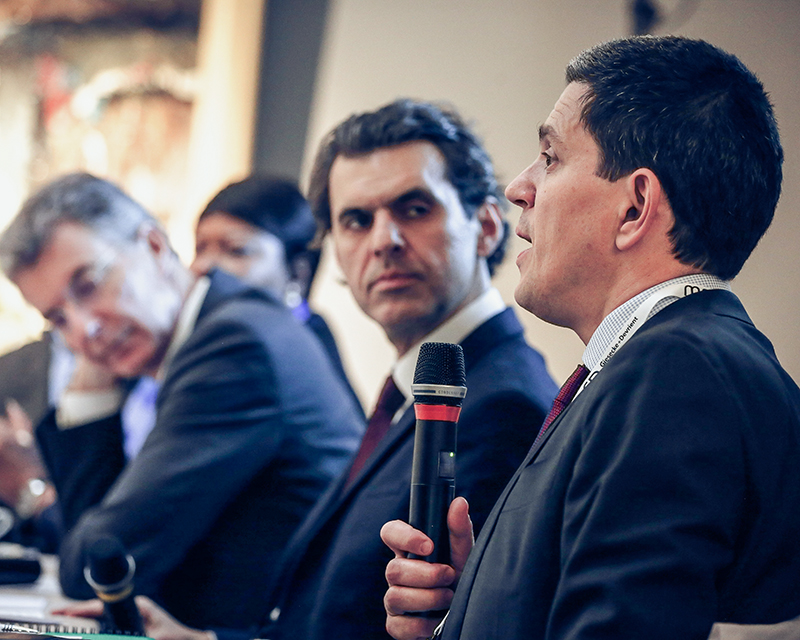UN representatives, statesmen and prosecutors, NGOs and local heroes gathered at the MSC side event “Neglect 2 Protect: R2P revisited” that took place on February 15 under the aegis of the Aurora Humanitarian Initiative. Facilitated by international talk-show host Ali Aslan, the event served as a platform to discuss how to implement the principle of responsibility to protect (R2P) in preventing and reacting to genocides, ethnic cleansing, war crimes and crimes against humanity.
Impediments of the implementation of protection need to be overcome, stated experts at the Munich Security Conference (MSC). After Ambassador Wolfgang Ischinger stated at the 2018 Aurora Dialogues Berlin that different parties are also guilty, if they can do something, but don’t act, this topic was further discussed at the MSC event.
In 2005, by committing to the principle of Responsibility to Protect (R2P), UN Member States declared themselves responsible for protecting their own populations from genocide, war crimes, ethnic cleansing and crimes against humanity. At the same time, the international community has the responsibility to react, protect and rebuild when a state is unable to protect its populations.
Participants of the event confirmed the validity of R2P but admitted that there is a gap between the rhetorical affirmation and actual practice. There was consensus that R2P needs to be put into practice regardless of the isolation of states and the division of societies that we currently witness, and that impunity for those that break with international law has to end.
In that context, Dr. Tom Catena, Chairman of the Aurora Humanitarian Initiative, said: “It’s now important more than ever for the international community to not leave humanitarian aid workers alone in our efforts to alleviate suffering. The principle of Responsibility to Protect (R2P) does not necessarily mean to put “boots on the ground.” Exercising global responsibility can also mean to establish deterrents, including no-fly zones. At the very least, the oppressing government should be aware that the international community is willing to take action.”
Speakers at the event included Fatou Bensouda, Prosecutor of the International Criminal Court, Dr. Tom Catena, Chairman of the Aurora Humanitarian Initiative, Christoph Heusgen, Ambassador, Permanent Representative of Germany to the United Nations, Jean-Pierre Lacroix, Under-Secretary-General for Peacekeeping Operations of the United Nations and David Miliband, President and CEO of the International Rescue Committee. They stated that while state sovereignty is indeed a right, it too often serves as an excuse for states to avoid consequences for wrongdoing in their domestic affairs, and that state sovereignty should be revoked if a state harms its own people. David Miliband, President and CEO of the International Rescue Committee indicated that we see an age of impunity when it comes to individual rights and what we witness these days is not only a deviation from R2P, but a concerted attack on it. In an interdependent world, sovereignty of states has to be qualified.
Christoph Heusgen explained that there are also further possibilities to address human rights violations as through naming and shaming. With putting pressure and PR on certain cases, aims in protecting humans can be reached step by step. Furthermore, he takes the impact and the collaboration with civil society organisations as a very important asset.
David Miliband also flagged up that there won’t be durable peace if there are no credible and legitimate institutions of sharing political power. Peace keeping would need a clear definition and could be much stronger and efficient if the end goal would be clear – otherwise it seems to be endless for political and non-political institutions.
Furthermore, participants agreed that international justice is a global project and in order for that project to succeed, nation states need to abide by the existing bodies serving to enforce international law, naming the UN Security Council and the International Criminal Court (ICC).
Fatou Bensouda, Prosecutor of the International Criminal Court, explained that the existing institutions are the best instrument we have to fight impunity and putting our work down is not an option. The work of the ICC is simply too important for this court to fail, even if we face resistance. International justice is a global project and humanity as a whole will benefit from it. She also demanded our thinking be reoriented. As there won’t be peace without justice, the focus should not only be on negotiating for peace but on looking for ways in which peace and justice can work together.






















































